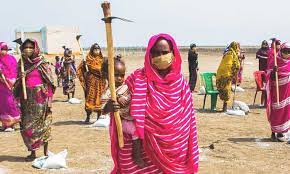By Haruna Gimba with agency report
Deteriorating economic conditions since the outbreak of COVID-19 pandemic, have fueled an increase in domestic violence and forced marriages in Sudan, a United Nations supported study has found.
The study, Voices from Sudan 2020, released this week is the first-ever nationwide qualitative assessment of gender-based violence (GBV) in the country, where a transitional government is now in its second year.
According to the United Nations Population Fund (UNFPA) and the Government’s Unit to Combat Violence Against Women (CVAW), co-authors of the report, tackling this issue is a top priority.
“The current context of increased openness of the Sudanese government and dynamism of civil society opens up opportunities for significant gains in the promotion of security and women’s rights,” they said.
The report aims to complement existing methods of data collection and analysis by ensuring that the views, experiences and priorities of women and girls are understood and taken into account.
Researchers found that communities perceive domestic and sexual violence as the most common GBV problems.
The main concerns include physical violence in the home, committed by husbands against wives and by brothers against sisters, as well as restrictions on movement to which women and girls have been subjected.
Another concern is sexual violence, especially against women working in informal jobs, but also refugee and displaced women when they leave camps, people with disabilities and children in Koranic schools.
Forced marriage is also important, according to the report. Most of these unions are arranged between members of the same tribe, or parents, without the knowledge of the girl.
Meanwhile, female genital mutilation (FGM) remains widespread in Sudan, with varying differences depending on geographic location and tribal affiliation.
Although knowledge of the illegality and harmfulness of the practice has reached the community level, child marriage and FGM are not seen as major concerns.
Women’s access to resources is also severely restricted. Men control financial resources and boys are favored for access to opportunities, especially education.
Verbal and psychological pressures to conform to existing gender norms and roles are widespread, in some cases leading to suicide.
The deteriorating economic situation since 2020 and COVID-19 have increased violence, especially domestic violence and forced marriages, according to the report.
Harassment in queues for essential supplies such as bread and fuel has also been reported.
Sudan continues to move forward on the path to democracy following the overthrow in April 2019 of President Omar Al-Bashir, who had been in power for 30 years.
In addition, the report states that it has not been possible over the past three decades to discuss gender-based violence.
“Data on GBV is sorely lacking, no nationwide assessment has been carried out over the past 30 years and a general lack of availability of qualitative and quantitative data,” the authors said.
To complete the assessment, some 215 focus group discussions were held with communities: 21 with GBV experts, as well as a review of existing studies and assessments.
Research was conducted between August and November 2020, covering 60 sites and camps, and the data was digitized via software for qualitative analysis, following a model first used in Syria.




